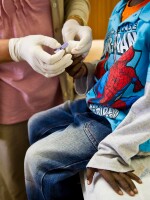Federal Medicare officials are embracing medical guidelines for the treatment of hepatitis C that could result in tens of thousands of older Americans getting access to expensive new drugs that can cure the deadly infection.
This policy change would pay for treatment with a combination of new, expensive drugs for patients who haven't responded to older treatment regimens and are approaching or have cirrhosis of the liver.
The shift has come about because of an Arizona man named Walter Bianco who was twice denied Medicare coverage for two new drugs that together cost about $150,000.
But those denials were reversed this week after Shots and NPR's Morning Edition reported on Bianco's case. Bianco has been infected with hepatitis C for 40 years, and the virus has taken a toll on his liver.
In a statement late Wednesday, Sean Cavanaugh, deputy administrator of the Centers for Medicare and Medicaid Services, said the reversal resulted from updated treatment guidelines that recommend the use of the new drugs and for patients in Bianco's case – even though the combination treatment hasn't been approved by the Food and Drug Administration.
Before now, Medicare hadn't explicitly embraced the treatment guidelines that were issued in January by the Infectious Disease Society of America and the American Association for the Study of Liver Diseases.
They say that patients who haven't been cured by older regimens should be considered for treatment with Sovaldi plus Olysio. Together they cost about $150,000 — a price tag that has alarmed health insurers and government payers and worried doctors who fear that life-saving medications could be withheld from hepatitis C patients.
Medicare officials note that under the program's Part D drug coverage, beneficiaries who have a medical need for drugs and meet "medically accepted indications" are "required to have access to needed therapies." The implication is that "medically accepted indications" includes treatment guidelines from outside medical groups
An estimated 3 million to 5 million Americans are infected with hepatitis C, a virus that can take decades to cause significant liver damage. But once it does, patients are at high risk of liver failure, requiring transplantation, or liver cancer.
Most people with hepatitis C don't know they have it. The Centers for Disease Control and Prevention recommends that all Americans born between 1945 and 1965 be tested for the virus, a step that is expected to increase demand for the new treatments.
Ryan Clary of the National Viral Hepatitis Roundtable, a patient advocacy group, says Medicare's new stance on paying for new hepatitis C treatments will have a big impact.
"This is a really positive step," he tells Shots. "A lot of people with hep-C are in Medicare or will be soon."
Private plans that administer Medicare drug benefits may still deny coverage of unapproved regimens such as Sovaldi and Olysio. But Clary says the new federal stance suggests patients might be more likely to prevail on appeal.
Medicare coverage of the new drugs, alone or in combination, is expected to have enormous cost implications.
Last week Cavanaugh acknowledged the cost impact in an address before a US Chamber of Commerce. According to an account by Inside CMS, Cavanaugh says the agency won't know how big an effect it will have until later this year.
Gilead Sciences, which makes Sovaldi, has reported that 90 percent of its $2.1 billion in first-quarter US sales went to patients covered by Medicare or commercial health plans, Inside CMSsays.
One clue to the possible impact will come in the next few weeks, when health plans that participate in Part D submit bids to Medicare for next year.
Copyright 2020 NPR. To see more, visit https://www.npr.org.



